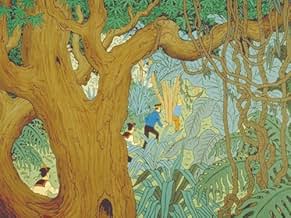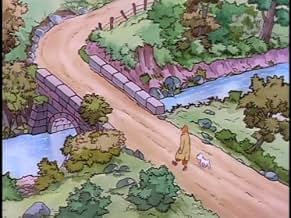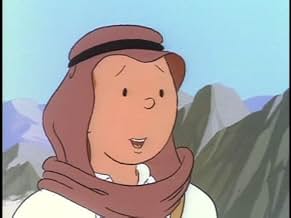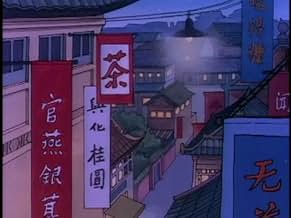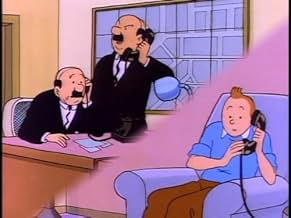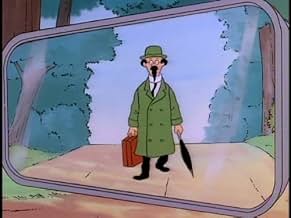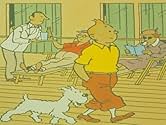Las aventuras del joven reportero Tintin, su perro fiel, y sus amigos, viajando alrededor del mundo.Las aventuras del joven reportero Tintin, su perro fiel, y sus amigos, viajando alrededor del mundo.Las aventuras del joven reportero Tintin, su perro fiel, y sus amigos, viajando alrededor del mundo.
- Premios
- 2 premios y 1 nominación en total
Explorar episodios
Argumento
¿Sabías que...?
- CuriosidadesProfessor Calculus talks about inventing High Definition television six years before high definition television existed.
- Versiones alternativasAll episodes aspect ratio were "matted" to 1.78:1 for some DVD/Blu-ray editions and digital platforms.
- ConexionesFeatured in Home and Away: Episodio #1.1314 (1993)
Reseña destacada
Firstly, let me affirm most of this series IS very faithful to the source. There are times you can follow the show and the book together for pages in a row with every scene and the dialog faithful captured to screen. But for such a faithful adaptation it's astonishing how little of the depth and variety of the comics is retained.
At the most basic level, the Tintin comics are adventure tales with some charming whimsy (sidetracks and double takes) and slapstick comedy... enough to appeal to an 11 year old. But there's intrigue, suspense, irony, politics, and (speaking only for the English translations) wonderful verbal humour also... material that unfolds well through one's teens and continues to appeal to an adult.
So as a repeat Tintin reader for decades I was delighted to find a complete box set of DVDs of the TV series. And subsequently most disappointed with the adaptation.
I've recovered from my initial disappointment to enjoy them as offered. Over the last couple of weeks I've re-watched the series from start to fin, with the books in hand as reference material, and I realise the flavour of the (usually but not always subtle) changes is consistent and intentional, with a presumption of a younger audience.
A BRIEF CATALOG of adjustments in style should serve to highlight what to expect...
All of the above and more are a consistent editorial style serving what adults perceive would be suitable for the presumed younger audience.
Overall as I say the basic sense of adventure story is preserved, the comic artwork style on screen is a match in almost all detail, and taken as presented the shows are done quite well. On *that* basis these shows are still OK entertainment.
For my own taste though I would have preferred all the sidetracks, irony, charm and wit of the original to be captured even if it meant the two TV episodes per story became three. Oh well.
At the most basic level, the Tintin comics are adventure tales with some charming whimsy (sidetracks and double takes) and slapstick comedy... enough to appeal to an 11 year old. But there's intrigue, suspense, irony, politics, and (speaking only for the English translations) wonderful verbal humour also... material that unfolds well through one's teens and continues to appeal to an adult.
So as a repeat Tintin reader for decades I was delighted to find a complete box set of DVDs of the TV series. And subsequently most disappointed with the adaptation.
I've recovered from my initial disappointment to enjoy them as offered. Over the last couple of weeks I've re-watched the series from start to fin, with the books in hand as reference material, and I realise the flavour of the (usually but not always subtle) changes is consistent and intentional, with a presumption of a younger audience.
A BRIEF CATALOG of adjustments in style should serve to highlight what to expect...
- Plot lines, sense of adventure, danger, and escape are generally well presented.
- Ironic humour is in general removed entirely or at least dumbed down.
- Any sarcastic dialog is also removed.
- Much of the dialog is subtly adjusted to be more straight forward.
- Suspense and intrigue are significantly diminished. In the comics there is often a slow unfolding as to who the major villain may be and with what motivations, but on screen they've chosen to lay details out for us as early as fit within each story. And sometimes sledgehammer the points home in case we miss them.
- In a couple of cases, whole major players (individuals or nations) are removed, presumably for simplification... eg in "The Calculus Affair" only the Bordurians appear. The Syldavian's are not mentioned.
- Political and economic backdrops are left out. eg in the Blue Lotus there's only the briefest mention of Japan occupying China, no mention at all of the "International Settlement", and aspects of the story related to those are simply left out.
- "Here we are, right back where we started". Or... not. While book- Tintin may experience more or less failed attempts escaping a situation (and we get to enjoy the efforts), on screen they generally show us just his successes to keep the plot moving along.
- Similarly, almost all the whimsy is taken out. The sticking plaster that won't give up, the Thompsons investigating wrong lines of enquiry, etc. ... I guess to pack the "real" plot into the screen time they've had to drop most of the tangents.
- Captain Haddock doesn't drink! This significantly alters the character (eg without alcohol he's dependable) and makes for a couple of only semi-successful story adjustments.
- Snowy doesn't talk! He's a clever and communicative dog, just no inner dialog. This is a shame since in the comics he has some superb lines to offer.
- The Thompsons' banter is ... simplified to the point of being plain. You'll hear no "Thompson, with a 'P' as in 'psychology'", and while they say "to be precise" a great deal it's rarely followed by the wit of the comic. This one's a real comedown.
- On a number of occasions, a scene is played out "faithfully" but misses either quite enough setup (due to the above edits) or else adjusts a crucial turn of phrase to be more straightforward ... and thus loses the playfulness or wit that comes out in the comics.
All of the above and more are a consistent editorial style serving what adults perceive would be suitable for the presumed younger audience.
Overall as I say the basic sense of adventure story is preserved, the comic artwork style on screen is a match in almost all detail, and taken as presented the shows are done quite well. On *that* basis these shows are still OK entertainment.
For my own taste though I would have preferred all the sidetracks, irony, charm and wit of the original to be captured even if it meant the two TV episodes per story became three. Oh well.
- imdb-22051
- 4 ago 2012
- Enlace permanente
Selecciones populares
Inicia sesión para calificar y añadir a tu lista para recibir recomendaciones personalizadas
- How many seasons does The Adventures of Tintin have?Con tecnología de Alexa
Detalles
Contribuir a esta página
Sugerir un cambio o añadir el contenido que falta




